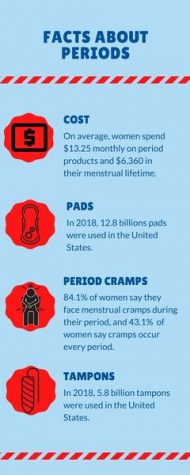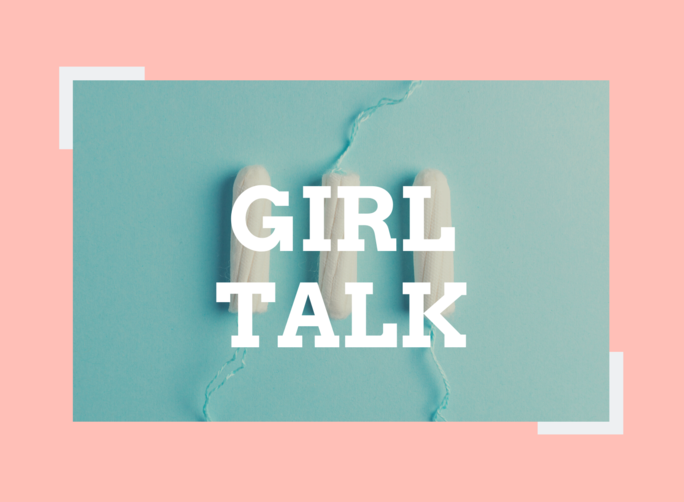Girl Talk: Putting an end to the stigma of menstruation
There is shame and guilt in talking about our periods. People with periods hold their tongues when talking about their experiences or any help they need. Over around 500 cycles in their lifetime, the average menstruator spends 6.7 years bleeding. They go through 9,600 tampons in their lifetime. They spend $6,360 on pads, tampons, and over-the-counter medication. Menstruators spend so much time and money on menstruation, yet they fear to talk about it freely.
To continue Girl Talk with Abbey Malbon, I talked to her about her experiences surrounding the stigma of period discussions.
“I was writing an Op-ed for Teen Vogue while I was at Metea,” former Metea student Abbey Malbon said. “I obviously was aware that people did not talk about their periods, but I was hoping it wouldn’t be that big of a deal. I was asked to speak to a sophomore English class about the writing process for an Op-ed. I went to the room, and I said the words ‘tampon’ and ‘pad’. People were looking around at each other like I had just said the f-word.”
The stigma outreaches discussions of period struggles; just the terminology makes people uncomfortable. Malbon discovered that even adults cannot get past the innate stigma they grew up with.
“When interviewing administrators, there would be male administrators who wouldn’t say ‘tampon’ or ‘pad’. They would say ‘product’ or ‘things.’”
 Often times, people conform to the social norm of its taboo label, despite possibly being raised that it is normal and should not be hidden from the discussion.
Often times, people conform to the social norm of its taboo label, despite possibly being raised that it is normal and should not be hidden from the discussion.
“I was always taught by my parents that my period was super normal and it was nothing to be afraid of,” Malbon said. “I was super open about talking about it with my family. As I grew older I learned that a lot of my friends weren’t comfortable talking about their periods.”
There are good reasons for menstruators to fear speaking openly about their periods. Ignorant and uneducated people may argue by invalidating one’s points or emotions due to menstruation or premenstrual syndrome. Although intensified and sometimes unpredictable, emotions are still emotions, and menstruators are still people.
One may joke, “Are you on your period?” when someone is acting irrationally.
“These jokes stem from insecurity and curiosity,” Malbon said.
Jokes like these bring on internalized misogyny in menstruators. Somewhere, they are wired to believe that they are less than. They keep their mouths shut about their periods to avoid invalidation. Deep down, they may believe that their period somehow deems them inferior to non-menstruators. This only perpetuates the issue beyond ignorance. It becomes a battle for every menstruator to overcome. Doing so empowers menstruators and women. Pushing past it raises feminism and dissipates the stigma.
To defeat the stigma, everyone, not just menstruators, needs to treat menstruating like a normal thing that happens every month. That is because it is. There are small ways to break the stigma, like by normalizing the mention of it in conversation. There are also bigger ways to punch down that wall, like by being an advocate for period equality like Malbon, or fighting against period poverty, or by being an ally to menstruators. Exposure to these topics has brought down the resistance to the movement. However, there is still a lot of progress to be made regarding menstruators and everything they go through.

Gray is the longform Editor and a copy Editor enjoying their second year on staff. They are an enthusiastic writer who will always sneak Oxford commas...

Madi Lumsden is a very outgoing person. She is often seen around the art hall playing her ukulele, carrying her pet mantis, Pepperoni, or ranting about...



Chickadee • Mar 12, 2020 at 8:32 am
This graphic reminds me of the time I had to revisit my “bloody” tampons one. Still petty.
Also the whole graphic department is doing beautiful oh my goodness. I’m so proud.
ayeee amber • Mar 11, 2020 at 3:16 pm
this was a great article and i’m glad girl talk is still going on. also amber keep writing! your other articles are amazing too. it’s just weird because society has this standard with women and disgust about natural human processes, such as menstruation, body hair, and breast-feeding.
VOA • Mar 11, 2020 at 9:51 am
Oh, I have so missed these articles. But I’m happy to see someone has taken up the mantle.
Now to work.
have you ever considered that this topic isn’t normalized in conversation because it’s gross? yes, it’s natural but that doesn’t mean it needs to be brought up in conversation like it’s nothing. That’s like arguing that people who have really bad diarrhea are being discriminated against when asked not to talk about it. If a man went around and talked about totally natural things that happen to him that he can’t control he would get labeled as creepy and would probably be detained. Your argument also fails to address the point that “Non-Menstrators”(seriously?? I’ll get to that later) are mostly not the ones who avoid conversation about it. In conversation, if a man talks about it to a woman he is deemed as a creep and the conversation is quickly shut down. Not to mention most girls choose not to talk about it to “Non-Menstrators”(I chuckle to myself every time I type that) as they claim we “don’t understand”. So if women did not have these reactions to conversation on this topic then I could KINDA see where this article would be at all relevant. But if you wanna start talking about gross bodily functions that women can’t control then, unfortunately, you will have to also allow for men to talk about gross bodily functions they can’t control. Overall I feel this article is a poorly disguised victimizing feminist rant that aims to elevate the ideas and policies of the writer while ignoring similar if not identical problems faced by the opposite gender. This can be seen in several places notably where the author promotes polarization of the two genders as “Menstrators” (victims) and “Non-Menstrators” (Evil men) as well as when the author referred to people who disagree as “Ignorant Uneducated people”. In conclusion, the author like many others thinks the point of feminism is to give women privileges but not match these privileges on the other side. Thus promoting further inequality between women and the ignorant uneducated non-menstrators.
Black Panther • Mar 11, 2020 at 8:22 am
To be honest, I get that its natural and shouldn’t be treated like “taboo” but people don’t want to talk about it because its a matter of personal hygiene. We don’t openly talk about what we do in our bathrooms or our sexual relations with our partners and we cannot admonish others for not wanting to hear about such topics/
q • Mar 9, 2020 at 9:37 pm
Bruh moment